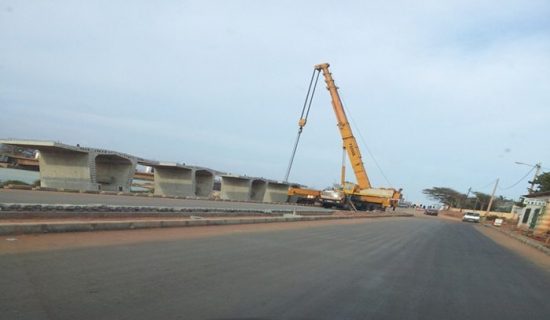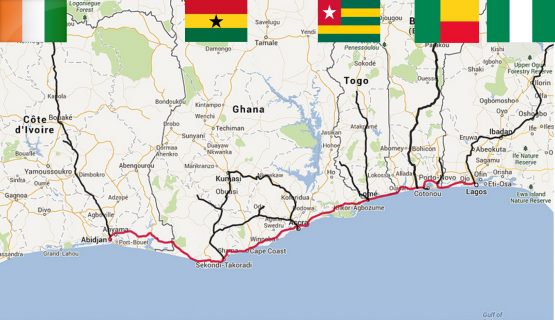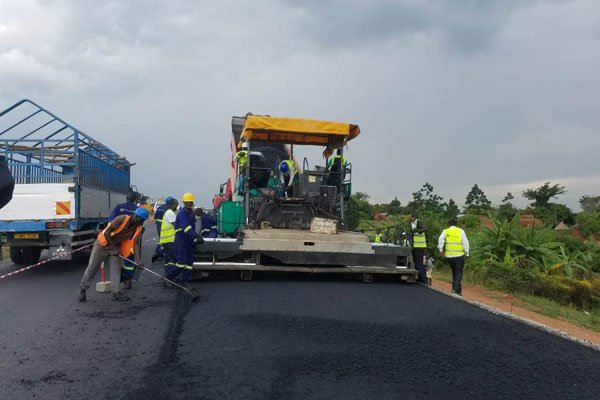The parties involved guaranteed their commitment to the implementation of the Abidjan-Lagos Corridor Highway Project. This took place during the 19th Steering Committee Meeting of Experts on the project which was held in Accra, Ghana.
The meeting was attended by Works, Roads, and Highways Ministers from the five member countries. The countries in question are Nigeria, Ghana, Togo, Cote d’Ivoire and Benin. Development partners such as the African Development Bank, the European Union, and the Japanese International Development Corporation were also present.
Reportedly, several critical topics were addressed during the meeting. These include feasibility and detailed design studies, public-private partnerships and trade and transport facilitation. Advisory on special development initiatives, financial and road safety audits, as well as the establishment of the Abidjan-Lagos Corridor Management Authority (ALCOMA) were also subjects of discussion.
The aim of the discussions ensure the successful implementation of the 1,028-kilometer six-lane dual highway, integrating rail infrastructure and industrial zones along the corridor. As a result, this will enable the sub-region to fully leverage the African Continental Free Trade Area (AfCFTA) and maximize the project’s potential.
About Lagos-Abidjan highway
The Trans–West African Coastal Highway is a transnational highway project to link 12 West African coastal nations, from Mauritania in the north-west of the region to Nigeria in the east, with feeder roads already existing to two landlocked countries, Mali and Burkina Faso.
The length of the route is 4,560km of which 83% or 3,777 km has been paved according to African Union (AU) documents, or 4,010 km with 3,260 km paved, according to African Development Bank (ADB) reports (which do not include the Nouakchott-Dakar section of about 570 km.
There are about 9 unpaved sections, but some paved sections require reconstruction. All are two-lane highways with the exception of short four-lane highways in the eastern third of the route. The ADB reports published in 2003 say that 32% of the highway is in poor condition, 9% is good and 59% is fair.
Reconstruction of the segment in Lagos, Nigeria began in 2010, and when it is complete that section will be ten lanes wide.
Reported earlier
March 2013
Lagos – Abidjan Expressway Construction Begins
The stretch of international road linking Nigeria’s economic hub, Lagos with Abidjan, the Ivorian capital would commence next year, Nigerian President Goodluck Jonathan has said.
President Jonathan who disclosed this when he met with the Cote d’Ivoire Investors Forum on the sideline of his state visit to that country, also explained that the funding of the project will be sourced from the private sector, development partners and banks, who will get a return on their investment by levying tariffs and tolls on users.
According to Jonathan, the need to concentrate on the construction of the Lagos – Abidjan Expressway was necessary to facilitate the trans-border movement of goods and persons and reduce the proliferation of local customs and police which make it difficult for businessmen to transport their goods.
He added that the Ivorian Minister of Infrastructure and the Nigerian Minister of Works has been asked to work with the ECOWAS Commission and that within two weeks they must come up with a blueprint and preliminary information on the project that will be discussed at the AU meeting in Addis Ababa in May.
He said they want a situation where the desk work will be completed this year and physical construction started by next year. The express road will be an ECOWAS road.
Feb 2014
Lagos-Abidjan road project gets a boost

ECOWAS heads of state and government have approved US$50 million for the feasibility study and design of the six-lane Lagos-Abidjan road project. The approval was made at a meeting of ministers of works chaired by the Nigerian president, Goodluck Jonathan, on the sidelines of the 22nd Ordinary Session of the Assembly of Heads of State and Government of the African Union (AU) in Addis Ababa, Ethiopia.
Speaking at the meeting, the chairman of the ministerial steering committee of the project and Nigerian Works Minister Mike Onolememen said with the fund, work would commence on the road project by the first quarter of this year. According to Onolememen, US$16 million is expected from the African Development Bank (ADB) thereby making the fund to be in excess of US$50 million.
Onolememen said they look forward to getting additional funds from development partners and multilateral agencies in order for the full design to be paid for adding that the project will transform the economy of the sub-region.
When completed, the road project would transverse Ghana, Benin Republic and Togo.
November 2017
A financial agreement signed for the construction of the Lagos-Abidjan Highway
The Federal Government of Nigeria has signed a financial agreement for the construction of the Lagos-Abidjan highway. This is according to the Minister of Power, Works and Housing, Babatunde Fashola, through a Senior Information Officer in the ministry Olusegun Ogunkayode.
The signing of the financial agreement is a demonstration of the federal government’s commitment to the realization of the project.
“West African countries must also emulate South American and Asia countries, who have used road development to drive their economies,” he said.
In this case, the Lagos-Abidjan corridor will propel rapid integration of the region, boost commercial activities, improve social development, create employment windows and reduce social vices among the member states.
Feb 2019
Nigeria to receive US $22.7m for the Abidjan-Lagos highway project
Nigeria is set to receive a whopping US $22m for the Abidjan-Lagos highway project after ECOWAS and the African Development Bank (AfDB) signed the loan agreement to develop the project.
ECOWAS Commission President, Jean-Claude Brou confirmed the reports and said the 1,080 km Abidjan-Lagos corridor would connect some of the largest and economically dynamic cities in Africa and also link vibrant seaports which served landlocked countries of the region.
“With the approval of the member states, the ECOWAS Commission forwarded financing requests of approximately 89 million dollars to several development partners, including AfDB and European Union, to fund the technical and project preparation studies,” said Jean-Claude.
Abidjan-Lagos highway project
The signing of the Grant Retrocession Agreement was between ECOWAS, AfDB, and the contracts for the feasibility, environmental, and socio-economic. The signing and detailed engineering designs for the six-lane highway were in recognition of the decision of the Presidents of Nigeria, Ghana, Cote d’Ivoire, Togo and Benin in 2014 on the construction of the highway.
“Promoting regional trade is enshrined in articles establishing AfDB and is a key pillar in the High Five priorities of the bank.”That is why the bank is investing heavily in high-quality regional transport infrastructure throughout the continent,” said Senior Director, AfDB, Mr Ebrima Faal.
Technical studies to be undertaken
The AfDB representative added that the objective of the Abidjan-Lagos Corridor Highway Study was to undertake all the needed technical studies for the effective implementation, operations and economic development of the highway.
Mr Mayne David-West, Pearl Consultants and Civil and Structural Engineers, who spoke on behalf of the other consultants, said the project design would take two years and would connect to the planned East-West coastal road.
The EU representative, Mr Kurt Cornelis, commented that the project fitted in the framework of the cooperation of the EU with the continent and also the region and acknowledged that the project would strengthen the competitiveness of the territories, stimulate investments, and encourage regional integration for development growth and job creation.
April 2022
Nigeria to receive US $22.7m for Abidjan-Lagos highway project
The African Development Bank (AfDB) stated recently that it had obtained the $15.6 billion needed to fund the 1,081 km Abidjan-Lagos highway project, which is expected to be completed in 2025.
The two ends of the large dual, 3-lane road will be at Bingerville in Abidjan and Mile 2 in Lagos, respectively. The highway is divided into three sections: 295 kilometres between Abidjan and Takoradi; 466 kilometres between Takoradi and Akanu (both in Ghana); and 320 kilometres between Noepe in Togo-Cotonou-Lagos.
The infrastructure would facilitate transport between Abidjan, with a population of 5 million people, Takoradi, with just under 1 million, Accra, with 2.5 million, Cotonou, with 2.6 million, and Lagos, with 15 million, which are among the most active seaport cities and most populated hubs in the West African region of the Gulf of Guinea.
According to World Bank statistics, the five states through which the route traverses have a combined GDP of $589 billion and a population of 284 million people.
Abidjan-Lagos Highway Project benefits to go beyond the Nigeria border

It is expected that the Abidjan-Lagos Highway will also help to open up West Africa’s landlocked countries, including Burkina Faso, Mali, and Niger. According to the AfDB, the Abidjan-Lagos coastline encompasses roughly 75 per cent of West Africa’s commercial operations.
The transportation industry contributes 5% to 8% of the region’s gross domestic product and is critical for economic development and the creation of employment, especially for women and young people.
Noteworthy, the Abidjan-Lagos highway is one of 16 projects in the African Union’s Programme for Infrastructure Development in Africa (PIDA) that the AfDB is implementing. It is critical to ECOWAS Vision 2050, which calls for the region to become completely integrated and interconnected.
The Abidjan-Lagos highway project’s ultimate purpose is to expand income-generation options for individuals in the region whose livelihoods are strongly reliant on modes of transportation. According to the financiers, the completion will be a game-changer.
Connection with other regional roads
The Abidjan-Lagos Highway is expected to be connected to another highway, the 440-kilometre Enugu-Bamenda corridor, funded by the AfDB, which connects southeast Nigeria and South-West Cameroon once completed.
The Dakar-Abidjan-Lagos highway is a much broader project, and the corridor is only a small part of it.
Benin, Burkina Faso, Côte d’Ivoire, Gambia, Ghana, Guinea Bissau, Guinea, Liberia, Mali, Nigeria, Niger, Senegal, Sierra Leone, and Togo are among the 14 West African countries that will be connected by this cross-border coastline highway.
May 2022
Funding Secured for Lagos-Abidjan Highway Construction Project
The African Development Bank (AfDB) president, Dr Akinwumi Adesina, recently said that the bank has secured $15.6 billion in funding for the construction of the Lagos-Abidjan highway.
The investment, according to the president, would boost regional trade and integration in West Africa by connecting the hinterlands of diverse Participating Member Countries (PMCs).
According to the president, the investment will involve providing seaport access to landlocked countries as well as several West African transition states.
The Lagos-Abidjan highway connects the capital cities of five Western African countries and spans 1,028 kilometres with eight border checkpoints. The countries involved include Benin, Ivory Coast, Ghana, Nigeria, and Togo.
It is said that the Abidjan-Lagos Corridor is seen as the Programme for Infrastructure Development in Africa’s (PIDA) signature project. It is a major part of the Trans African Highway Network in the ECOWAS region and is part of the larger Dakar-Lagos Corridor.
Starting in Bingerville, a suburb of Abidjan, and concluding in Mile 2 Eric Moore, in Lagos, the corridor currently runs through all five PMCs’ major economic centres.
The Significance of the Lagos-Abidjan Highway to the Economy
The Lagos-Abidjan highway, according to an AfDB statement, is an important regional trade and transit corridor that connects some of Africa’s most crowded and economically dynamic cities, including Abidjan, Accra, Cotonou, Lomé, and Lagos.
The corridor also is said to connect other corridors along the north-south axis and connects the landlocked countries of Burkina Faso, Mali, Niger, and Chad.
In a statement released by the bank, the corridor connects the sub-most region’s densely populated and economically active areas, intersecting with a rail network and major ports.
The bank claimed that the transport sector in West Africa is critical to the region’s economic development, accounting for around 5 per cent to 8 per cent of GDP, acknowledging that an efficient regional transportation network is an enabling infrastructure required, among other factors, to facilitate regional trade and socio-economic growth.

HI AM A GHANAIAN AND RESIDENT OF TAKORADI,AM MORE CONCERN ABOUT INFRASTRUCTURE IN WEST AFRICA AND IN PARTICULLY ON THIS TRANS ECOWAS HIGHYWAY ABIDJAN GHANA TOGO,ALSO I WILL GLAD TO GET YOUR CONTACT THROUGH MY EMAIL.
REGARDS.